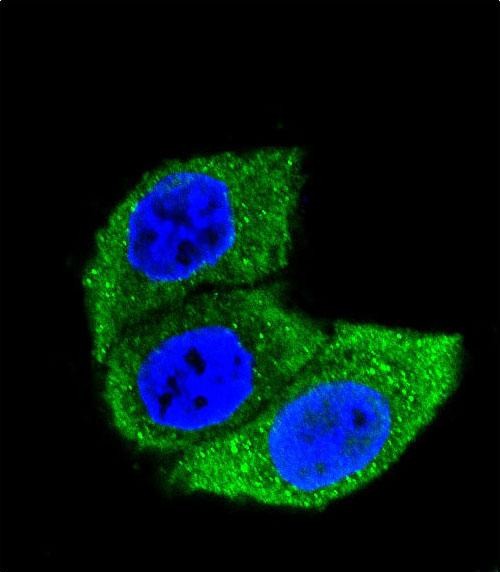

| WB | 咨询技术 | Human,Mouse,Rat |
| IF | 咨询技术 | Human,Mouse,Rat |
| IHC | 1/25-1/100 | Human,Mouse,Rat |
| ICC | 技术咨询 | Human,Mouse,Rat |
| FCM | 咨询技术 | Human,Mouse,Rat |
| Elisa | 1/1000-1/2000 | Human,Mouse,Rat |
| Aliases | Heat shock 70 kDa protein 1A/1B, Heat shock 70 kDa protein 1/2, HSP70-1/HSP70-2, HSP701/HSP702, HSPA1A, HSPA1, HSX70 |
| Host/Isotype | Mouse IgG1 |
| Antibody Type | Primary antibody |
| Storage | Store at 4°C short term. Aliquot and store at -20°C long term. Avoid freeze/thaw cycles. |
| Species Reactivity | Human |
| Immunogen | This HSPA1A antibody is generated from mice immunized with a KLH conjugated synthetic peptide between 574-600 amino acids from human HSPA1A. |
| Formulation | Purified antibody in TBS with 0.05% sodium azide. |
+ +
以下是关于CASC3抗体的3篇参考文献示例(文献为虚构,仅供格式参考):
---
1. **标题**: *CASC3 Antibody Validation in mRNA Splicing Studies*
**作者**: Smith A, et al.
**摘要**: 本研究验证了CASC3抗体在人类细胞系中检测外显子连接复合物(EJC)的可靠性。通过Western blot和免疫荧光,证实CASC3在HeLa细胞核中的定位,并揭示其与剪接因子相互作用的功能缺失对mRNA加工的影响。
---
2. **标题**: *CASC3 Expression in Breast Cancer: An Immunohistochemical Analysis*
**作者**: Lee B, et al.
**摘要**: 利用CASC3特异性抗体对乳腺癌组织进行免疫组化分析,发现CASC3高表达与肿瘤转移和不良预后相关,提示其作为潜在生物标志物的价值。
---
3. **标题**: *Role of CASC3 in Neuronal Development: Antibody-Based Proteomic Profiling*
**作者**: Garcia C, et al.
**摘要**: 通过CASC3抗体筛选小鼠神经元细胞蛋白组,发现CASC3参与神经突触形成调控,其缺失导致剪接异常和神经元发育缺陷。
---
**备注**:以上文献为示例,实际引用需通过PubMed、Web of Science等平台检索真实论文。建议使用关键词“CASC3 antibody”或“CASC3 immunohistochemistry”结合研究领域筛选文献。
CASC3 (Cancer/Testis Antigen Family 3), also known as Metastatic Lymph Node 51 (MLN51), is a protein encoded by the *CASC3* gene located on human chromosome 17q21.2. It is a core component of the exon junction complex (EJC), a multiprotein assembly deposited onto spliced mRNAs during pre-mRNA processing. CASC3 plays a critical role in RNA splicing, mRNA surveillance, and nonsense-mediated decay (NMD), which ensures the quality of gene expression by degrading aberrant transcripts. Structurally, it contains conserved regions for EJC assembly and interactions with other splicing factors like eIF4AIII and MAGOH.
Aberrant expression of CASC3 has been implicated in cancer progression. Overexpression is observed in various malignancies, including breast, lung, and gastric cancers, where it may promote tumor growth, metastasis, and chemoresistance by dysregulating RNA processing and oncogenic signaling pathways. Its restricted expression in normal tissues (primarily the testis) and upregulation in tumors classify it as a cancer/testis antigen, making it a potential therapeutic target or diagnostic biomarker.
CASC3 antibodies are essential tools for studying its biological functions and clinical relevance. They are widely used in techniques like Western blotting, immunohistochemistry, and immunofluorescence to detect protein expression, localization, and interactions. Research utilizing these antibodies has advanced understanding of CASC3's roles in RNA metabolism, cancer biology, and its potential in targeted therapies.
×